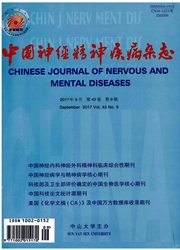

 中文摘要:
中文摘要:
目的 探讨单纯性糖耐量受损对脑梗死患者病情严重程度及预后的影响。方法 随机选择脑梗死后正常血糖患者32例、单纯性糖耐量受损患者43例和糖尿病患者34例,发病1、4周均用美国国立卫生院卒中评分(National Institutes of Health Stroke Scale,NIHSS)评定患者的病情严重程度,用Barthel生活指数(Barthel index,BI)评定患者的日常生活能力,用改良的Rankin量表(modified Rankin Scale,mRS)评定患者的病残程度,并于12、24周时再次进行BI及mRS。结果 单纯性糖耐量受损组及糖尿病组发病1周时的NIHSS分别为6(0~23)和5.5(0~22),与正常血糖组3(0~16)相比,差异有统计学意义(P均〈0.05);而糖尿病组、单纯性糖耐量受损组发病1周时的NIHSS评分之间的差异无统计学意义(P〉0.05)。单纯性糖耐量受损组发病4周、12周及24周时的预后不良率分别为61.4%、46.5%及32.6%,糖尿病组分别为55.9%、47.1%及50.0%,与正常血糖组的28.1%、18.8%及9.4%相比,差异均有统计学意义(P均〈0.05);而单纯性糖耐量受损组与糖尿病组两组之间的差异均无统计学意义。结论 伴发单纯性糖耐量受损的脑梗死患者病情较重,预后不良;积极监测和治疗单纯性糖耐量受损可能成为改善脑梗死患者预后的有效措施之一。
 英文摘要:
英文摘要:
Objective To analyze the influence of isolated impaired glucose tolerance on the pathogenetic condition and prognosis of cerebral infarction. Methods 32 cases of cerebral infarction with euglycemia, 43 cases of cerebral infarction with I-IGT and 34 cases of cerebral infarction with diabetes were analyzed. The pathogenetic condition of the lth week after onset and the prognosises of 4^th week, 12^th and 24^th week after cerebral infarction were observed prospectively. Results NIHSS was used to evaluated the severity of cerebral infarction. Compared with euglycemics 3 (0 - 16), the I-IGT 6(0-23) and diabetics 5.5 (0 -22) have higher scores of NIHSS, the differences were statistically significant. But the difference of scores of NIHSS between I-IGT and diabetics was not statistically significant. On the other hand, at 4^th week, 12^th and 24^th week after cerebral infarction, the rate of bad prognosis of the patients with I-IGT (61.4% ,46.5% and 32. 6% ) and diabetes mellitus (55.9% ,47.1% and 50. 0% ) were higher than patients with euglycemia (28.1% , 18.8% and 9. 4% ) , the differences were statistically significant. But the difference of rate of bad prognosis was not statistically sig- nificant between patients with I-IGT and diabetes mellitus. Conclusions As same as diabetes, I-IGT not only exacerbated the severity of cerebral infraction, but also had poor influence on the prognosis of cerebral infarction. Monitoring and correcting I-IGT may be a good measure of improving the prognosis of cerebral infarction.
 同期刊论文项目
同期刊论文项目
 同项目期刊论文
同项目期刊论文
 期刊信息
期刊信息
